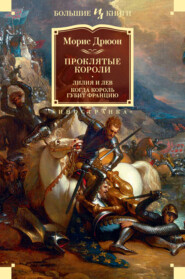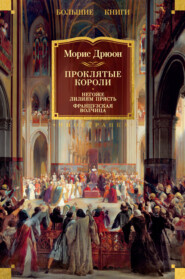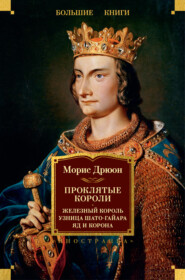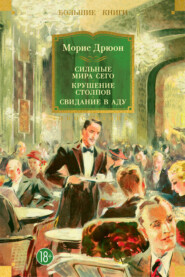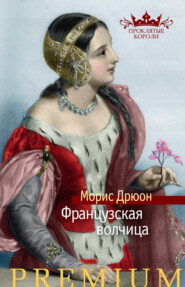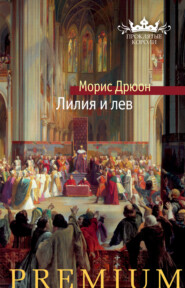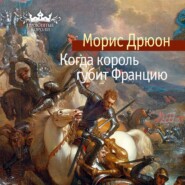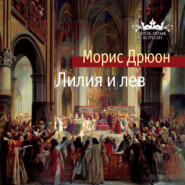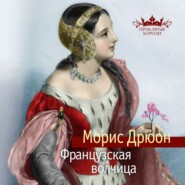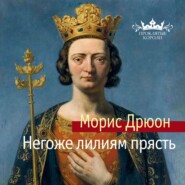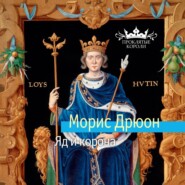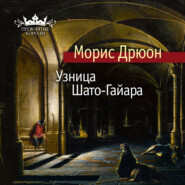По всем вопросам обращайтесь на: info@litportal.ru
(©) 2003-2024.
✖
The Accursed Kings Series Books 1-3: The Iron King, The Strangled Queen, The Poisoned Crown
Автор
Год написания книги
2018
Настройки чтения
Размер шрифта
Высота строк
Поля
From a refinement of cruelty, or perhaps contempt, he and the principal dignitaries of the Order had been imprisoned in the cellars, now transformed into dungeons, of the great tower of the Hôtel-du-Temple, their own building, their Mother House.
‘To think that it was I who had this tower repaired!’ the Grand Master murmured angrily, hitting the wall with his fist.
The blow made him cry out, it renewed an appalling pain in his hand, whose crushed thumb was no more than a stump of half-healed flesh. But indeed, what part of his body was neither an open sore nor the seat of some internal agony? Since he had suffered the torture of the boot, he had been a victim to bad circulation in the legs and abominable cramps. His legs strapped between boards, he had undergone the sharp anguish of oaken wedges tapped into place by the executioners’ mallets, while Guillaume de Nogaret, Keeper of the Seals of the Kingdom, asked him questions, trying to persuade him to confess. To confess what? He had fainted.
Dirt, damp and lack of food had had their effect upon his torn and lacerated body.
And more recently he had undergone the torture by stretching, the most appalling perhaps of all those to which he had been subjected. A weight of two hundred pounds had been tied to his right foot while he, old as he was, had been hoisted to the ceiling by a rope and pulley. And all the time Guillaume de Nogaret’s sinister voice kept repeating, ‘Confess, Messire, why don’t you confess?’ And since he still obstinately refused, they had hauled him from floor to ceiling more hurriedly, more jerkily. He had felt his limbs becoming disjointed, the articulations parting, his whole body seemed to be bursting, and he had begun to scream that he would confess everything, admit every crime, all the crimes of the world. Yes, the Templars practised sodomy among themselves; yes, to gain entrance to the Order, it was necessary to spit upon the Cross; yes, they worshipped an idol with the head of a cat; yes, they practised magic, and sorcery, and had a cult for the Devil; yes, they embezzled the funds confided to their care; yes, they had fomented a plot against the Pope and the King … And what more besides?
Jacques de Molay wondered how he had managed to survive it all. Doubtless because the tortures had been exactly calculated, never pushed to the point where there was a risk of his dying, and because, too, the constitution of an old knight, trained to arms and war, had greater resistance than he himself could have believed.
He knelt down, his eyes turned towards the beam of light that entered by the little window.
‘Oh, Lord my God,’ he cried, ‘why hast Thou given me greater strength of body than of mind? Was I worthy to command the Order? Thou hast not prevented my falling into cowardice; spare me, Lord God, from falling into folly. I cannot hold out much longer, no, not for much longer.’
He had been in chains for seven years, only leaving his dungeon to be dragged before the commission of inquiry, and to be submitted to all the pressures and threats that the theologians and lawyers could devise.
In the circumstances one might well fear madness. Often the Grand Master lost all sense of time. As a distraction, he had attempted to tame a couple of rats that came every night to eat the remains of his bread. He passed quickly from anger to tears, from crises of religious devotion to a longing for violence, from idiocy to fury.
‘They’ll die of it, they’ll die of it,’ he kept repeating to himself.
Who would? Clement, Guillaume, Philip. … The Pope, the Keeper of the Seals and the King. They would die. Molay did not know how, but it would certainly be amid appalling suffering and in expiation of their crimes. He unceasingly chewed over these three hated names.
Still upon his knees, his beard raised towards the narrow window, the Grand Master murmured, ‘I thank thee, Lord God, for leaving me hatred. It is the sole force that sustains me now.’
He got painfully to his feet and went back to the stone bench which, cemented to the wall, served both for seat and bed.
Who could ever have thought that he would come to this? His mind constantly returned to his youth, to the boy he had been fifty years before, as he came down the slopes of his native Jura in search of adventure.
Like all the younger sons of the nobility of the time, he had dreamed of wearing the long white mantle with the black cross, the uniform of the Order of the Knights Templar. In those days, the mere name of Templar evoked the epic and the exotic, ships with bellying sails scudding towards the Orient, lands where the skies were always blue, charges at the gallop across the desert sands, treasures of Arabia, ransomed prisoners, captured and pillaged cities, fortresses with huge staircases, built beside the sea. It was even said that the Templars had secret ports from which they embarked for unknown continents.
And Jacques de Molay had achieved his dream; he had marched proudly through distant cities, clothed in the superb mantle whose folds hung down to his golden spurs.
He had risen in the Order’s hierarchy, higher than he had ever dared hope, achieving every dignity in turn, at last to be elected by the brothers to the supreme function of Grand Master of France and Overseas, and to the command of fifteen thousand knights.
And all this had but led to a dungeon, horror and destitution. Surely few people’s lives could show such prodigious success followed by so great a fall.
Jacques de Molay was idly tracing lines with one of the links in his chain upon the damp mould on the wall, lines which reminded him of the plan of some fortress, when he heard heavy footsteps and the noise of arms upon the staircase that led down to his cell.
Once more he was seized with a feeling of pain, but this time it was precise and definite.
The heavy door creaked open and, behind the gaoler, Molay saw four archers dressed in leather tunics and carrying pikes. Their breath spread out in a thin cloud before their faces.
Their chief said, ‘We have come to fetch you, Messire.’
Molay rose silently to his feet.
The gaoler came forward and with cold chisel and heavy blows of a hammer broke the rivet that fastened the chain to the heavy iron anklets. Each weighed four pounds.
He clasped his great, illustrious mantle, now no more than a grey rag, its black cross in tatters at the breast, about his emaciated shoulders.
They left the dungeon. And in that reeling exhausted old man, his feet weighed down with fetters as he mounted the tower’s steps, there could still be seen something of the commander who had recaptured Jerusalem from the Saracens for the last time.
‘Oh, Lord my God,’ he murmured to himself, ‘give me strength, give me a little strength.’ And to help himself find it, he repeated the names of his three enemies: Clement, Guillaume, Philip.
Fog lay thick upon the huge court of the Temple, cloaked the turrets of the enclosing wall, flowed through the crenellations, and obscured the spire of the great church on the right of the tower.
A hundred soldiers were standing at ease, talking quietly among themselves, as they stood round a big, square, uncovered wagon.
From beyond the walls he could hear the murmur of Paris and the occasional neigh of a horse, sounds that moved him with an ineffable sadness.
Messire Alain de Pareilles, Captain of the King’s Archers, the man who attended every execution, who accompanied the condemned to sentence and torture, was walking up and down the centre of the yard, his face impassive, his expression bored. He was forty years old and his steel-coloured hair fell in a short fringe across his square forehead. He wore a coat of mail, had a sword at his side, and carried his helmet in the crook of his arm.
He turned as he heard the Grand Master’s approach, and the latter, seeing him, turned pale, if it were possible for his pallor to increase.
Merely for interrogations there was not, as a rule, so much display; there were neither wagon nor men-at-arms. A few royal agents came to escort the accused, generally at nightfall, by boat across the Seine.
The presence of Alain de Pareilles was alone significant enough.
‘Has judgment been pronounced?’ Molay asked the Captain of the Archers.
‘It has, Messire,’ he replied.
‘And do you know, my son,’ Molay asked after a moment’s hesitation, ‘what that judgment contains.’
‘I do not, Messire. My orders are to conduct you to Notre-Dame to hear it read.’
There was a silence, then Jacques de Molay asked, ‘What day is it?’
‘The Monday after the feast of Saint Gregory.’
This corresponded to the 18th March, the 18th March 1314.
‘Am I being taken out to die?’ Molay wondered.
The door of the tower opened again, and three other dignitaries appeared in their turn, escorted by guards, the Visitor General, the Preceptor of Normandy and the Commander of Aquitaine.
They had white hair, and white unkempt beards, their deep-sunken eyes blinked in the light, their bodies seemed to float in their ragged mantles; for a moment they stood still, like great night-birds unable to see in the light. Moreover, the Commander of Aquitaine had a white film over his left eye which gave him something of the appearance of an owl. He seemed completely stupefied. The semi-bald Visitor General had horribly swollen hands and feet.
It was Geoffroy de Charnay, the Preceptor of Normandy, who first, though hampered by his irons, rushed up to the Grand Master and embraced him. There was a long friendship between the two men. Indeed, it was Jacques de Molay who had helped Charnay in his career. Ten years younger than himself, he had looked upon Charnay as his successor.
Charnay’s forehead was furrowed by a deep scar, the legacy of an old battle in which a sword-cut had also given him a crooked nose. This rugged man, his face marked by war, leant his forehead against the Grand Master’s shoulder to hide his tears.
‘Have courage, Brother, have courage,’ said the Grand Master, clasping him in his arms. ‘And you, too, my Brothers, have courage,’ he went on, embracing the other dignitaries in turn.
Seeing each other, they were able to judge of their own appearance.
A gaoler came up.






